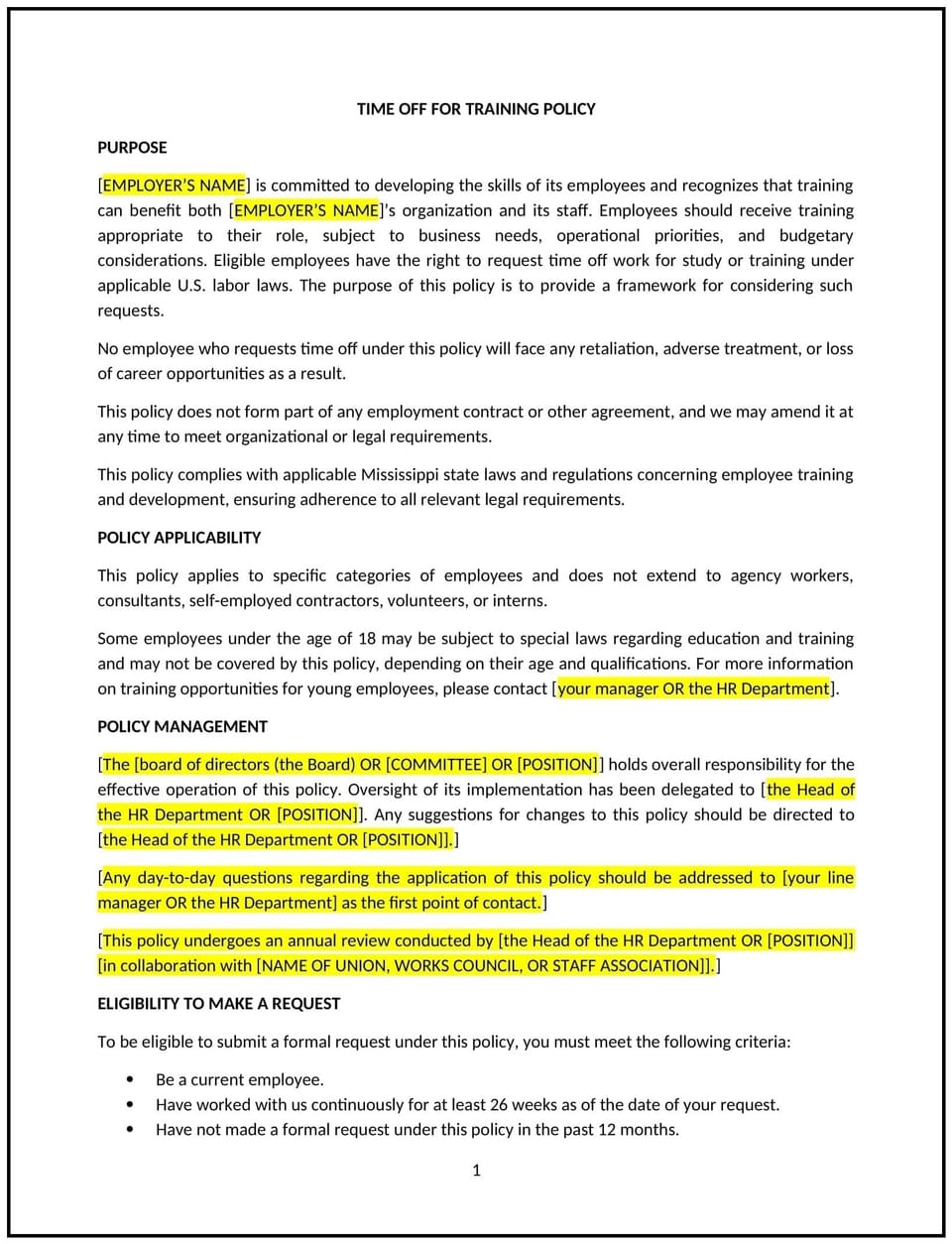Time off for training policy (Mississippi): Free template

Time off for training policy (Mississippi)
A time off for training policy helps Mississippi businesses establish guidelines for providing employees with leave to participate in professional development, industry certifications, or job-related training programs. This policy clarifies eligibility, approval processes, and expectations for training leave.
By implementing this policy, businesses can support skill development, enhance workforce capabilities, and improve overall productivity.
How to use this time off for training policy (Mississippi)
- Define training eligibility: Specify the types of training that qualify for time off, such as job-related certifications, industry workshops, and compliance courses.
- Set approval requirements: Establish a process for employees to request training leave, including advance notice and required documentation.
- Clarify paid and unpaid leave: Determine whether training leave is paid, partially paid, or unpaid based on company policies and business needs.
- Outline training reimbursement: Specify whether businesses will cover training costs and any conditions for reimbursement.
- Establish return-to-work expectations: Require employees to provide proof of training completion or share key learnings with their teams.
- Address scheduling considerations: Ensure training leave does not disrupt essential business operations.
- Review and update the policy regularly: Adjust the policy as business needs and industry requirements evolve.
Benefits of using this time off for training policy (Mississippi)
This policy offers several benefits for Mississippi businesses:
- Enhances workforce skills: Encourages employees to develop expertise relevant to their roles.
- Improves job performance: Helps employees stay up to date with industry standards and best practices.
- Boosts employee retention: Demonstrates a commitment to professional development, increasing job satisfaction.
- Strengthens business competitiveness: Supports a well-trained workforce that adapts to changing market demands.
- Encourages knowledge sharing: Promotes continuous learning and collaboration within teams.
Tips for using this time off for training policy (Mississippi)
- Set clear eligibility criteria: Define which training programs qualify for leave.
- Require advance notice: Employees should submit training leave requests early to allow for scheduling adjustments.
- Align training with business goals: Encourage employees to select training that benefits both their roles and the company.
- Track training participation: Maintain records of approved training leave and program completion.
- Encourage knowledge sharing: Ask employees to present key takeaways to their teams after completing training.
Q: Why should Mississippi businesses offer time off for training?
A: Training leave helps employees gain skills that improve job performance and benefit overall business operations.
Q: What types of training should businesses approve for leave?
A: Businesses should approve job-related certifications, professional development courses, and industry-specific training relevant to employee roles.
Q: Should training leave be paid or unpaid?
A: Businesses should decide based on company policy, the nature of the training, and whether it directly benefits the organization.
Q: How should employees request training leave?
A: Employees should submit a formal request with details about the training, duration, and expected benefits.
Q: Can businesses require employees to share what they learn?
A: Yes, businesses can encourage employees to present key takeaways to their teams to maximize the value of training.
Q: What happens if training leave disrupts business operations?
A: Businesses should evaluate requests based on workload demands and may need to reschedule training to minimize disruptions.
Q: How often should this policy be reviewed?
A: Businesses should review the policy annually to ensure it remains relevant to training needs and company goals.
This article contains general legal information and does not contain legal advice. Cobrief is not a law firm or a substitute for an attorney or law firm. The law is complex and changes often. For legal advice, please ask a lawyer.


